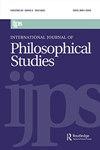理性的实践。融合推理主义和科学形象
IF 0.6
3区 哲学
0 PHILOSOPHY
INTERNATIONAL JOURNAL OF PHILOSOPHICAL STUDIES
Pub Date : 2022-03-15
DOI:10.1080/09672559.2022.2057684
引用次数: 9
摘要
在过去的三十年里,英美哲学出现了复兴,努力将人类推理视为构成性的社会推理,事实上,是话语性的。这种方法并不主要将理性视为个人对环境中事件的单独解释和预测以及相应地制定单独计划和决策的一个器官,从而提高个人做得好的机会,只是从衍生角度来看,理性也是一个能够与其他有理性的个人进行理性社会互动的器官。相反。理性在本质上被视为语言交流、人际信息共享和合作的一个器官,在派生上也被视为个人孤独、内化推理的一个机构。当然,推理的一种方法是在与他人对话时进行推理,当我们制定联合行动计划时,通过提出主张来说明原因,通过提出问题来询问原因,并批判性地质疑对方的主张或决定以及为其提供的理由。根据上述观点,这种合作推理和话语推理是推理的原始模式,其他模式,如国际推理,也从中衍生出来。Ladislav Koreń在他的优秀著作中使用了Dorit Bar On创造的一个术语,称这种观点为“语言理性主义”(4) Koreń的切入点是观察到,当代主要的“语言理性主义者”,如Robert Brandom、Huw Price和John McDowell,在维特根斯坦、Wilfrid Sellars、Michael Dummett和Donald Davidson等人物的经典作品的基础上,主要是纸上谈兵,主要忽略了关于人类(和灵长类动物)社会认知、话语能力,以及推理。用Kore的话说,本文章由计算机程序翻译,如有差异,请以英文原文为准。
Practices of Reason. Fusing the Inferentialist and Scientific Image
The last three decades have seen a renaissance in Anglo-American philosophy of efforts to think of human reasoning as constitutively social and, indeed, discursive. This approach does not see reason primarily as an organ for an individual’s solitary explanations and predictions of events in the environment and for making solitary plans and decisions accordingly – thus enhancing the individual’s chances to do well – and only derivatively also as an organ that enables rational social interaction with other reasoning individuals. Rather the other way around. Reason is seen as primarily and constitutively an organ for linguistic communication, for the interpersonal pooling of information, and for cooperation, and only derivatively also as an organ for an individual’s solitary, internalized ratiocinations. Surely one way to reason is to reason in dialogue with others, when we make plans for joint actions, give reasons by making claims, ask for reasons by posing questions, and critically query each other’s claims or decisions and the reasons given for them. And according to the view in question, such cooperative and discursive reasoning is the original mode of reasoning, from which other modes, such as reasoning in foro interno, derive. Using a term coined by Dorit Bar-On, Ladislav Koreň, in his excellent book, calls this view ‘language rationalism.’ (4) Koreň’s point of entry is the observation that key contemporary ‘language rationalists,’ such as Robert Brandom, Huw Price, and John McDowell, building on classical works by figures such as Wittgenstein, Wilfrid Sellars, Michael Dummett, and Donald Davidson, proceed largely in armchair fashion, mainly ignoring empirical work on human (and primate) social cognition, discursive abilities, and reasoning. This, in Koreň’s words,
求助全文
通过发布文献求助,成功后即可免费获取论文全文。
去求助
来源期刊

INTERNATIONAL JOURNAL OF PHILOSOPHICAL STUDIES
PHILOSOPHY-
CiteScore
0.90
自引率
0.00%
发文量
29
期刊介绍:
The International Journal of Philosophical Studies (IJPS) publishes academic articles of the highest quality from both analytic and continental traditions and provides a forum for publishing on a broader range of issues than is currently available in philosophical journals. IJPS also publishes annual special issues devoted to key thematic areas or to critical engagements with contemporary philosophers of note. Through its Discussion section, it provides a lively forum for exchange of ideas and encourages dialogue and mutual comprehension across all philosophical traditions. The journal also contains an extensive book review section, including occasional book symposia. It also provides Critical Notices which review major books or themes in depth.
 求助内容:
求助内容: 应助结果提醒方式:
应助结果提醒方式:


